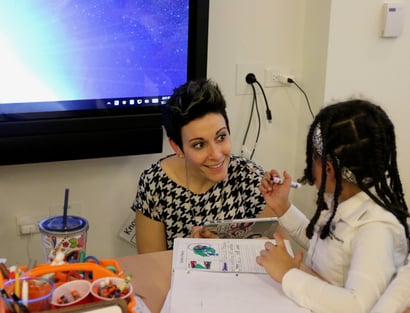STUDENT REPORT CARDS: GOING BEYOND THE A,B,Cs
February 7, 2017 admin Education, GEMS World Academy Chicago, Student-Centered Learning, Assessment, Curriculum Standards
For generations, we have accepted letter grades like A, B, and C as fair and accurate measures of student performance. But a number of schools, both public and private, around the country have started investigating alternate ways of assessing student learning.
Why? Because letter grades don't do an adequate job of charting a student's overall academic performance and progress, some educators and education experts say. Noted letter-grade critic Alfie Kohn argues that letter grades create a false sense of achievement. Students trying to earn higher grades may avoid difficult assignments and classes that push them to learn difficult materials, he says. Instead of rewarding ambition, letter grades often punish it.
Others believe that letter grades fail to document student progress over time. A ninth-grade student who reads at a fourth-grade level will receive low grades because he or she does not understand complicated reading materials. Even if that student learns to read at a sixth-grade level during the semester, he or she may still fail. Assigning a letter grade, therefore, does not show how much progress the student has made.
 GEMS World Academy Chicago is one of the schools that forgoes traditional letter grades in favor of a "standards-based" assessment system, which emphasizes the fact that learning is a process.
GEMS World Academy Chicago is one of the schools that forgoes traditional letter grades in favor of a "standards-based" assessment system, which emphasizes the fact that learning is a process.Students at GEMS receive report cards twice each school year. Rather than A through F grades, the report cards contain narratives that describe how the student is performing, how the student has progressed and what the student needs to work on going forward.
The narratives in the report cards are accompanied by ratings that show how students are achieving when measured against curricular standards. In Lower School (preschool through Grade 5), the students are evaluated as "needs support," "approaching expectations," "meeting expectations" or "exceeding expectations." In Middle School, student achievement is ranked on an 8-point scale for a series of criteria.
"Our assessment model focuses on student development and growth over time," Head of School Kim Wargo said. "Often in traditional grading, students (and parents) get focused on the 'letter,' which is an end-point, rather than the areas for growth, which is a process."
The assessment philosophy at GEMS places a priority on students' self-reflection and their assessments of their work, school leaders say.
"Our individual student assessment promotes a growth mindset in students because it highlights areas for further focus, work, and investigation, rather than assigning a set 'score' for mastery," Wargo said.
Standards-based assessment has taken hold at a number of schools around the country. And educators have developed numerous other alternatives to the letter-grade system. Some popular alternatives developed by researchers and educators include gamification, which uses a system of rewards to keep students motivated; metacognition & reflection, which places a stronger emphasis on student reflection; and a "grade, iterate, replace" approach, which uses traditional letter grades as a starting point, rather than a final evaluation.
To be sure, letter grades continue to be the norm in most school systems, and students and parents often resist attempts to change that. But as schools are tasked with preparing students for an increasingly connected and complex world, it's likely the debate over how best to measure student progress will continue.
Submit this form to request information about GEMS World Academy Chicago.